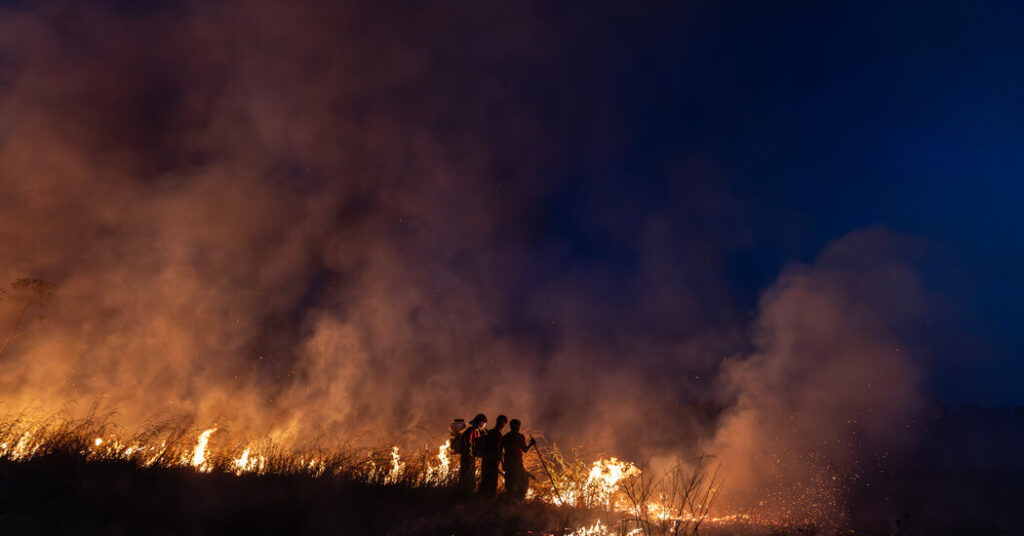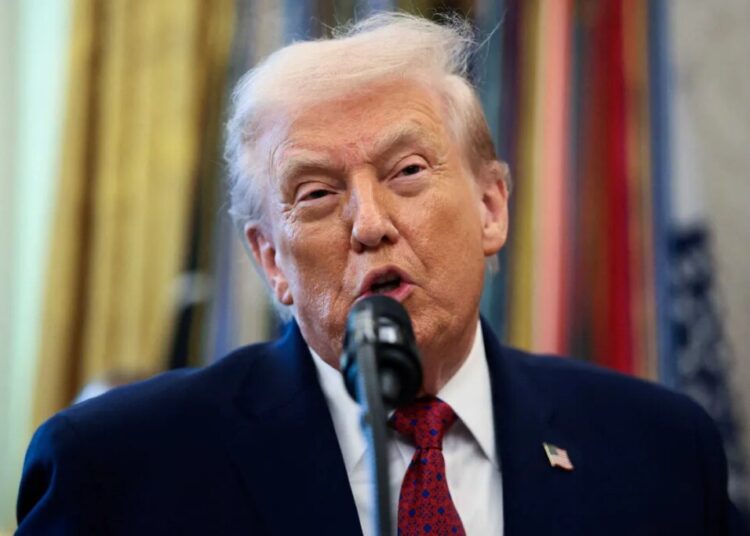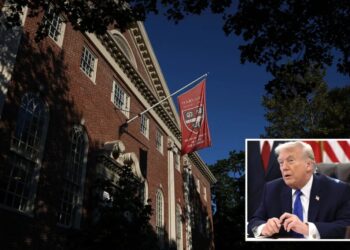Earlier this month, I walked in a patch of protected Amazon rainforest and caught a glimpse of the world as it once was.
Enormous Ipê trees burst through the canopy, towering above the rest of the forest. Hundred-year-old vines tied the ground to the sky. Thousands of leafcutter ants swarmed in and out of their subterranean colonies.
I was in Paragominas, Brazil, reporting on efforts to curb fire in the Amazon. Nearly 20 percent of the Amazon has been lost in recent decades, but today it is fire, not logging, that is the greatest threat to the world’s largest tropical forest. The vast majority of these fires are man-made, often from clearing land for agriculture. Left unaddressed, these blazes could push the region toward an irreversible tipping point.
Stopping the fires that are consuming the Amazon is no small task. With climate change pushing global temperatures ever higher, the rainforest has become more combustible, and terrible fire seasons have ravaged Brazil in recent years. Fire is still the easiest way for farmers to quickly convert forest into farmable land.
Yet the techniques that are most effective at slowing down fires can be modest: asking farmers to plant different crops, letting forests grow back and pooling resources to afford machinery that can clear land instead of resorting to intentional burns.
Which is to say, protecting the Amazon is feasible. As Daniel Nepstad, a tropical ecologist who is leading some of these efforts, told me: “Fire is the biggest threat to the Amazon, but it’s also a problem that’s possible to solve.”
A climate summit in the Amazon
My trip to Paragominas was a bit of a side quest. The main reason for my visit to Brazil was to help cover the annual United Nations climate conference, known as COP30.
President Luiz Inácio Lula da Silva insisted on hosting the event in Belém, a relatively poor city near the mouth of the Amazon River. This meant foregoing major cities like Rio de Janeiro and São Paulo, which would have had an easier time accommodating an influx of more than 50,000 attendees. The result was a certain amount of predictable chaos.
Delegates slept on cruise ships because hotel rooms were unavailable. Many world leaders and business executives skipped the proceedings altogether. For the first time, the United States did not send a delegation, although that had more to do with the Trump administration’s indifference to climate talks than the travel logistics. The main conference venue suffered from faulty plumbing and leaky roofs. Then a fire consumed part of the event space.
The outcome of COP30 was also unsatisfactory to many of the attendees. After two weeks of speeches by world leaders and diplomats, the final resolution approved by the nearly 200 governments at the gathering made no direct mention of fossil fuels, the main driver of global warming. (Read more about the final agreement from Max Bearak and Lisa Friedman.)
But it was never clear what another proclamation about phasing out coal, oil and gas would actually accomplish. For years now, it has been apparent that what matters more than what countries are saying is how they are spending their money.
And from that perspective, the near future has been relatively easy to discern: led by the United States, the world continues to pour money into fossil fuels. As a result, global temperatures are set to keep rising for years to come. COP30 was never going to change any of that.
A fund for forests
But what was achieved at COP30? Hosting the summit in the Amazon had symbolic power, just as President Lula intended. Indigenous people made their voices heard. Açaí and pirarucu, a large local fish, were featured on many menus. And one of the few green shoots to emerge from the meeting came, appropriately, in the form of trees.
Ahead of the formal opening of the summit, Brazil announced a new fund designed to protect tropical forests. (Manuela Andreoni wrote about the fund last year.) If it works as designed, governments and philanthropies will pay billions of dollars to get countries around the world to protect unspoiled wilderness.
Brazil’s forest fund won’t change the course of climate change on its own. But it’s the kind of practical solution that can help, particularly in the absence of a rapid, global phase out of planet-warming emissions. Forests are important sinks for carbon dioxide, and play a crucial role in cooling the planet.
The creation of the fund is also perhaps a sign that the global community is belatedly coming to appreciate the crucial importance of protecting nature.
For years, climate talks have focused on how quickly nations can transition to cleaner forms of energy, and how rich nations can support developing countries. Those are critical topics, to be sure, but they also can overshadow more fundamental issues, such as preserving what’s left of the natural world.
“The Amazon has an intrinsic value,” Erika Berenguer, a researcher at the University of Oxford who studies the region, told me before I departed for Brazil.
I was reminded of her words as I stood in the protected forest in Paragominas, the hum of the bugs thrumming in my ears, the moisture from the trees weighing on my skin.
“We don’t necessarily find an external reason to give importance for it to live,” Berenguer said, “in the same way that we don’t necessarily find external reasons for why a child is important being alive.”
The Trump administration
In one week, Trump makes sweeping changes to environmental policy
Last week, environmental rollbacks came one after the other, potentially affecting everything from the survival of rare whales to the health of the Hudson River. If the Trump administration’s proposals are finalized and upheld in court, they could reshape U.S. environmental policy for years to come, environmental lawyers and activists said. The changes included:
-
The Environmental Protection Agency proposed to strip federal protections from millions of acres of wetlands and streams, narrowing the reach of the Clean Water Act.
-
Federal wildlife agencies announced changes to the Endangered Species Act that could make it harder to rescue endangered species from the brink of extinction.
-
The Interior Department moved to allow new oil and gas drilling across nearly 1.3 billion acres of U.S. coastal waters, including a remote region in the high Arctic where drilling has never before taken place. — Maxine Joselow
In case you missed it
-
A delicious way to help the Amazon. A new group of craft chocolate markers, Somini Sengupta writes, are “at the vanguard of what Brazil is hoping to promote to the world: The idea that there is money to be made from products that can save the Amazon, not devour it.”
-
A fight against coal could help bankrupt Oakland, Calif.: After the city reneged on a contract allowing coal shipments, a Kentucky company went under. Courts now say the city must pay hundreds of millions of dollars in damages.
-
Park Rangers have waited weeks for back pay: As many as 100 seasonal workers at the National Park Service have not received some back pay after being furloughed during the government shutdown, Maxine Joselow reports. Some seasonal workers are waiting as long as four weeks to receive the funds.
Quote of the day
“The whole village is destroyed — trash, TVs, fridges and mud are everywhere. Everyone was turned upside down. I don’t know where and how to begin to start life again.”
That’s from Huynh Ngoc Phuong, 51, who lives in the Kahn Hoa province of Vietnam. Across the country, more than 90 people have died and more than 200,000 homes have been flooded in a deadly rainy season that has been supercharged by climate change, Damien Cave and Tung Ngo report.
That has left some wondering if the Vietnamese government did enough to warn residents. “Geographically, Vietnam is especially vulnerable,” they write. “A 2024 study identified it as a climate change “hot spot,” showing that warming temperatures adding moisture to the atmosphere and heating up the South China Sea would combine with typhoon patterns to create a vortex of risk.”
The Climate Quiz
This question comes from a recent Times article about climate and the environment. Click on an answer to see if you’re right. (The article is free.)
This enormous pile of trash, 500 feet wide and up to four stories tall, was illegally dumped, a practice known as “fly-tipping.” It was only recently discovered by local authorities. Where was it found?
More climate news from around the web:
-
“Soaring electricity prices are triggering a wave of power shut offs nationwide, The Washington Post reports, leaving more Americans in the dark as unpaid bills pile up.” In New York City, residential shut offs in August were up fivefold from a year ago.
-
Politico Magazine reports on Stardust Solutions, a secretive company that has plans to use solar geoengineering to dim the light of the sun. (For more read our series on the rise of geoengineering from last year.)
Thanks for being a subscriber.
Read past editions of the newsletter here.
If you’re enjoying what you’re reading, please consider recommending it to others. They can sign up here. Browse all of our subscriber-only newsletters here. And follow The New York Times on Instagram, Threads, Facebook and TikTok at @nytimes.
Reach us at [email protected]. We read every message, and reply to many!
David Gelles reports on climate change and leads The Times’s Climate Forward newsletter and events series.
The post Tentative Signs of Hope as the Amazon Burns appeared first on New York Times.




